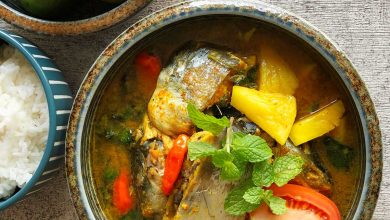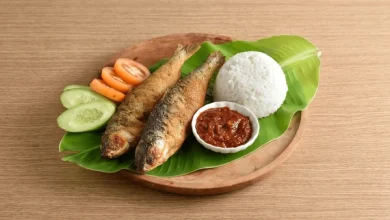Pempek Palembang with Mackerel Fish (Ikan Tenggiri)
A beloved traditional dish hailing from Palembang, Pempek is a savory fish cake made from minced mackerel fish and sago flour, often served with a tangy vinegar sauce that perfectly complements its rich flavors. The following recipe will guide you through creating these delightful fish cakes, ensuring a delightful culinary experience that showcases the authentic flavors of Indonesian cuisine.
Ingredients
| Ingredient | Amount |
|---|---|
| Mackerel fish (minced) | 500 grams |
| Sago flour (either sagu tani or good quality Rose Brand) | 400 grams |
| Cold water | 250 ml |
| Fine salt | 1 ½ teaspoons |
| Flavor enhancer (optional) | 1 teaspoon |
| Water for boiling Pempek | 2 liters |
| Sago flour for dusting hands | 200 grams |
| Vegetable oil | 1 tablespoon |
For the Vinegar Sauce:
| Ingredient | Amount |
|---|---|
| Boiling water | 750 ml |
| Palm sugar or coconut sugar | 500 grams |
| Bird’s eye chilies (adjust according to taste) | 25 pieces (crushed) |
| Garlic (crushed) | 1 bulb |
| Vinegar | 2 tablespoons |
| Tamarind paste | 3 tablespoons |
Instructions
-
Prepare the Fish Mixture:
Begin by combining the minced mackerel fish with 250 ml of cold water in a large mixing bowl. Use your hands to mix thoroughly; this method allows you to feel for any lumps of fish that may need to be broken apart.Related Articles -
Add Seasonings:
To the fish mixture, add 1 ½ teaspoons of fine salt and 1 teaspoon of the optional flavor enhancer. As you mix in the salt, you will notice the consistency of the mixture thickening. Continue to mix by hand until the salt and flavor enhancer are evenly distributed throughout the fish. -
Incorporate Sago Flour:
Gradually introduce the 400 grams of sago flour into the fish mixture. It’s essential to sprinkle the flour in little by little rather than adding it all at once, as this helps maintain an even consistency. Gently fold the mixture with your hands, turning it over repeatedly to avoid compacting it, which could lead to tough pempek. -
Shape the Pempek:
Dust your hands with 200 grams of sago flour to prevent sticking. Take about 100 grams of the fish mixture and shape it into a ball about the size of a tennis ball. Next, roll the ball out on a cutting board that has been sprinkled with sago flour, forming it into a cylinder approximately 15-18 cm long. -
Boil the Pempek:
Bring 2 liters of water to a boil in a large pot, adding 1 tablespoon of vegetable oil to prevent the pempek from sticking. Carefully drop the shaped pempek into the boiling water. Repeat this step until all the fish mixture is used up. -
Cook Until Done:
Allow the pempek to boil until they float to the surface, which indicates they are cooked. Once floating, use a slotted spoon to remove them from the water, and place them on a plate to drain. -
Cut and Fry the Pempek:
Once the pempek has cooled slightly, cut them into slices approximately 2.5 cm thick. Heat oil in a frying pan and fry the slices until they are golden brown and crispy.
Preparing the Vinegar Sauce
-
Create the Sauce Base:
In a pot, boil 750 ml of water, and add the 3 tablespoons of tamarind paste and 500 grams of palm sugar. Stir until the sugar has completely dissolved and blended with the water. -
Strain the Sauce:
After boiling, strain the sauce through a fine sieve or tea strainer to remove any solids, ensuring a smooth consistency. -
Flavor the Sauce:
To the strained sauce, add the crushed bird’s eye chilies and garlic, mixing thoroughly to incorporate their flavors into the vinegar sauce. -
Storage:
The vinegar sauce can be refrigerated and stored for future use.
Final Assembly
For serving, arrange the crispy pempek on a plate and offer the tangy vinegar sauce on the side for dipping. The combination of the savory fish cakes with the bright and spicy sauce creates a truly authentic Palembang culinary experience.
You can store any uncooked pempek in a tightly sealed container in the refrigerator if not frying them all at once, allowing for a quick and delicious meal later on. Enjoy the delightful flavors and textures of this traditional Indonesian dish that brings warmth and joy to any dining table!




